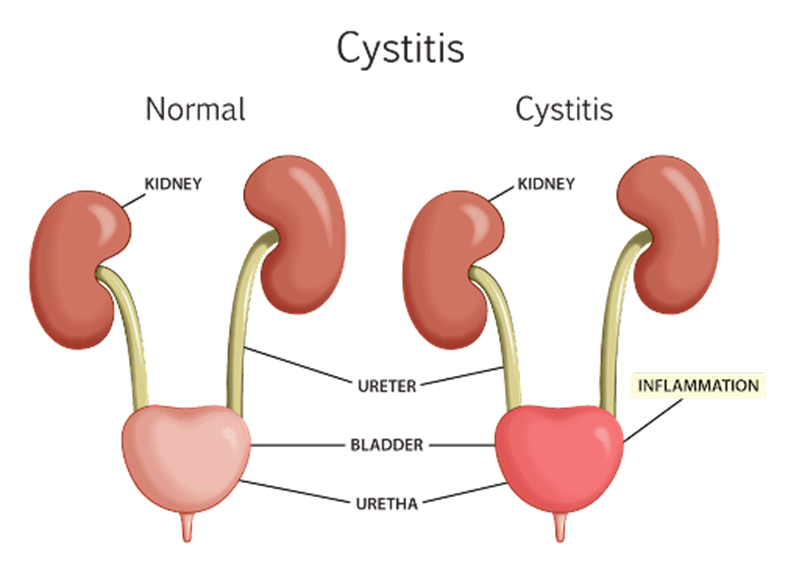A client with cystitis receives a prescription for phenazopyridine. Which information should the nurse explain to the client about its therapeutic effect?
Eliminates urinary bacteria.
Use the medication after voiding after sexual intercourse.
Calms spasms in the urinary tract.
Provides an analgesic effect for irritated bladder mucosa.
The Correct Answer is D
Choice A reason:
Phenazopyridine does not eliminate urinary bacteria. It is not an antibiotic and does not have antibacterial properties. Instead, it is used to relieve symptoms such as pain, burning, and discomfort caused by irritation of the urinary tract. Therefore, this choice is incorrect.
Choice B reason:
Using phenazopyridine after voiding or after sexual intercourse is not a standard recommendation. This medication is typically taken after meals to reduce stomach upset. It is not specifically indicated for use after sexual intercourse, and this choice does not align with the typical usage instructions for phenazopyridine.
Choice C reason:
Phenazopyridine does not calm spasms in the urinary tract. Its primary function is to provide symptomatic relief from pain, burning, and discomfort in the urinary tract. It does not have antispasmodic properties, so this choice is also incorrect.
Choice D reason:
Phenazopyridine provides an analgesic effect for irritated bladder mucosa. It works by numbing the lining of the urinary tract, which helps to alleviate pain and discomfort associated with conditions like cystitis. This is the correct therapeutic effect of the medication.

Nursing Test Bank
Naxlex Comprehensive Predictor Exams
Related Questions
Correct Answer is B
Explanation
Choice A reason: Taking tamsulosin early in the day is not necessary. Tamsulosin should be taken approximately 30 minutes after the same meal each day to ensure consistent absorption and effectiveness1. The timing of the dose is less critical than ensuring it is taken after the same meal daily.
Choice B reason: Tamsulosin can cause orthostatic hypotension, which is a sudden drop in blood pressure when standing up from a sitting or lying position. This can lead to dizziness or fainting. Therefore, it is crucial to instruct patients to stand and sit up slowly to prevent falls and injuries.
Choice C reason: Reducing daily fluid intake is not recommended for patients taking tamsulosin. Adequate hydration is important for overall health and can help manage urinary symptoms associated with BPH. There is no evidence suggesting that fluid restriction improves the effectiveness of tamsulosin.
Choice D reason: Tamsulosin should be taken daily, not on a twice-a-week dosing schedule. Consistent daily dosing is necessary to maintain stable blood levels of the medication and ensure its effectiveness in managing urinary retention due to BPH.
Correct Answer is C
Explanation
Choice A Reason:
I should take this medication only when I am having an asthma attack: This statement is incorrect because montelukast is not a rescue medication. It is a maintenance medication designed to be taken regularly to prevent asthma symptoms and attacks. Using it only during an asthma attack would not provide the intended preventive benefits.
Choice B Reason:
I will not need to use my inhalers twice a day when I start this medicine: This statement is also incorrect. Montelukast is often used as an adjunct therapy and does not replace the need for inhalers, especially for those with moderate to severe asthma. Inhalers, particularly corticosteroids, remain a critical part of asthma management.
Choice C Reason:
I will take the tablet every evening to control my asthma: This statement is correct. Montelukast is typically prescribed to be taken once daily in the evening. This helps to control asthma symptoms and prevent attacks by reducing inflammation and constriction in the airways.
Choice D Reason:
This medication will stop an asthma attack immediately: This statement is incorrect. Montelukast is not a fast-acting medication and will not provide immediate relief during an asthma attack. Fast-acting bronchodilators, such as albuterol, are used for immediate relief.
Whether you are a student looking to ace your exams or a practicing nurse seeking to enhance your expertise , our nursing education contents will empower you with the confidence and competence to make a difference in the lives of patients and become a respected leader in the healthcare field.
Visit Naxlex, invest in your future and unlock endless possibilities with our unparalleled nursing education contents today
Report Wrong Answer on the Current Question
Do you disagree with the answer? If yes, what is your expected answer? Explain.
Kindly be descriptive with the issue you are facing.
